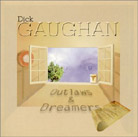May 2002
It would be a mistake to think that this excellent CD is about subtleties of technique rather than about the songs’ powerful messages, but technique drives communication very effectively in this case. Unlike other Gaughan recordings, this one features only Gaughan on vocals and guitar. Brian McNeill plays fiddle and concertina on just a couple of tunes. One of the most striking and instructive traits of Gaughan’s method is counterintuitive: Even with so little instrumental support, he often plays only one to three strings of his guitar. In Woody Guthrie’s "Tom Joad," after one cursory strum of a full chord to orient the listener, Gaughan creates an urgent buzz by rapidly hitting one mid-range guitar note, intermittently strumming a few more strings. "Tom Joad got out of the old McAlester Pen / It’s there he got his parole / After four long years on a man killing charge / Tom Joad come a-walking down the road," the Grapes of Wrath-inspired classic begins. It tells the story of the impoverished Joad family’s journey west from dustbowl Oklahoma, culminating in Tom’s flight after he kills a murdering deputy sheriff. As the drama builds, so do the guitar chords. Only a masterful folksinger such as Gaughan can convey those 17 verses’ range of intense emotion without a hitch. Equally artistic techniques succeed throughout the disc. Whereas indignation against injustice and a plea for solidarity among ordinary people guide "Tom Joad," Phil Ochs’s "When I’m Gone" confronts the knowledge that one’s life on Earth is one’s only time to experience anything or make a contribution. Gaughan again plays the guitar minimally, but more gently this time, and he sings this one more pensively, in accordance with the lyrics. "John Harrison’s Hands," by Gaughan and accompanist Brian McNeill, fleshes out the moral dimensions of the Board of Longitude’s refusal, in the 18th century, to pay prize money owed to the song’s namesake for building the first accurate seaworthy timepiece that enabled sailors to calculate longitude. The Board denied Harrison, Gaughan explains in a note, "because he had little formal education and was not of the establishment." In that one, in "Wild Roses" (by Kimmie Rhodes), and in other songs on Outlaws & Dreamers, we hear Gaughan’s gift for bringing out the best in melodies without becoming maudlin or self-indulgent. This CD is a rare treasure for the way it brilliantly melds the grippingly musical and eternally moral aspects of folk music. GO BACK TO: |
 Dick Gaughan - Outlaws
& Dreamers
Dick Gaughan - Outlaws
& Dreamers![[Reviewed on CD]](../format/regcd.gif) Outlaws
& Dreamers by Dick Gaughan is many things: the latest release in the 30-year
career of a true folksinger’s folksinger, 11 fine tracks, a stern lesson to those of
us who may think we know how to sing and accompany ourselves on the guitar, and an
artistic statement. As Gaughan states regarding the title song, "’Outlaws’
[here] does not mean criminals -- it refers to those who refuse to conform to
society’s conventions and prejudices. And those who know the value of making songs
out of their dreams."
Outlaws
& Dreamers by Dick Gaughan is many things: the latest release in the 30-year
career of a true folksinger’s folksinger, 11 fine tracks, a stern lesson to those of
us who may think we know how to sing and accompany ourselves on the guitar, and an
artistic statement. As Gaughan states regarding the title song, "’Outlaws’
[here] does not mean criminals -- it refers to those who refuse to conform to
society’s conventions and prejudices. And those who know the value of making songs
out of their dreams."